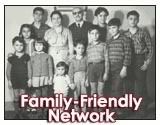Friday, March 02, 2007
Q & A with Marvin Olasky
1. What's the book about?
At its basic level it's about Americans who go to Turkey for a vacation -- I spent a month there two years ago -- and are kidnapped by Turkish Hezbollah; the question then is how to get away and whether to forget about the whole thing or attempt to fight back. In another sense Scimitar's Edge is about America and the war against terrorism: Now that it's almost five years since 9/11 many of us almost seem to be on vacation again, but the terrorists are not.
2. You're a journalist and professor by trade, with about 18 non-fiction books in your past. What led you to turn to fiction?
Largely fun. In one sense I was playing SIM Turkey: Drop four people into a harsh foreign environment, give them action and adventure, build a romance … I grew to like the characters and wanted to see what they would do. I also enjoyed the challenge: I've written lots of nonfiction books and know how to do that, but this was all new.
3. Is your research for fiction different from your nonfiction research?
The trunk is common - as I traveled through Turkey I took notes on geography, food, customs, and so forth - but the branches differ. My nonfiction research emphasizes accuracy concerning what has happened; for example, every quotation has to be exactly what a person said. In fiction, though, I'm inventing dialogue, yet everything that happens has to be true to the characters and the situation.
4. What's been the feedback from your fans since your switchto fiction? Oh, are there fans?
Actually, I've gotten excellent reactions from many of the folks who like my nonfiction. A few worry about sexual allusions - one of the characters is a serial adulterer and two of the others, as they fall in love, encounter sexual tension. Scimitar's Edge is also an action/adventure novel so there's some shooting, and one of the main characters is a terrorist who relishes lopping off heads. So anyone who wants a sugary book should look elsewhere.
5. You also include some descriptions of what's been called "the forgotten holocaust" a century ago, and explain some Turkish history.
Turkey was the proving ground for the first sustained governmental attempt at genocide, as Turks killed over one million Armenians and sent many to concentration camps; Hitler admired that effort. But Turkey has often been a central player in world affairs, not a backwater. Nearly two millennia ago Turkey became a Christian stronghold: The seven churches John addresses in the book of Revelation, for example, were in what is now Western Turkey. Going back one millennium, what is now Turkey was the front line for a clash of Christian and Muslim cultures.
6. I know you wrote your doctoral dissertation about film and politics from the 1930s through the 1960s, a time when Westerns were one of the dominant genres, and I see certain Western-like elements in this book.
Westerns came in about seven different varieties, and one of them was called the "revenge Western," where a bad man has killed a beloved person and the hero heads out to bring him to justice. In nuanced Westerns the hero at various points asks himself whether his end justifies his means and whether it's worth giving up a lot to carry out what he planned. An internal struggle of that sort occurs in this book as well.
7. Scimitar's Edge is an unusual novel that combines action against terrorists with quotations from Walker Percy. In fact, the book ends with an allusion to one of Percy's most enduring characters, Will Barrett. Were you consciously trying to walk a knife-edge between high-brow and low-brow culture?
Not consciously; that's just where I am myself. Since evangelicals are sometimes disparaged as dumb, some press to show we're not by tossing around Latin phrases or going to opera rather than popular movies -- not that there's anything wrong with opera, as long as there's a car chase within the first five minutes. To me it comes down to enjoying the pleasures God gives us, including those from both popular culture and literary culture.
8. Are you planning a sequel?
When I talk with students about careers we discuss the importance of both internal calling and external calling - do you feel God's pleasure as you do something, and do other people think you're good at it? I feel the internal call to write more novels; I'm trying to discern the external call from readers.








































